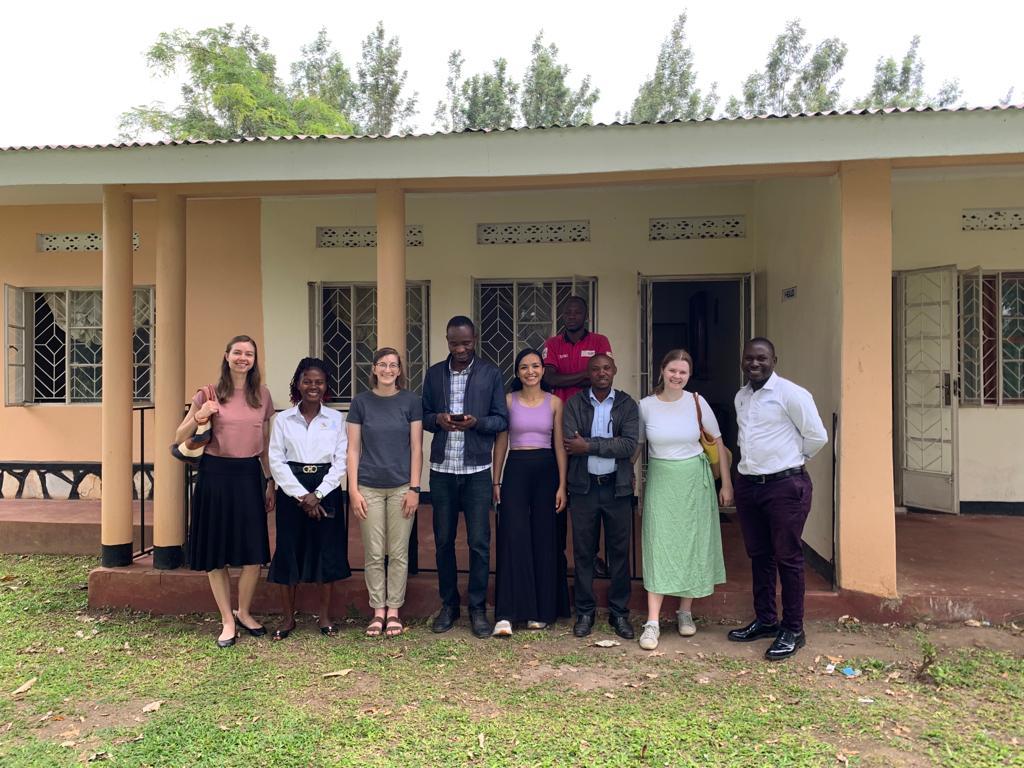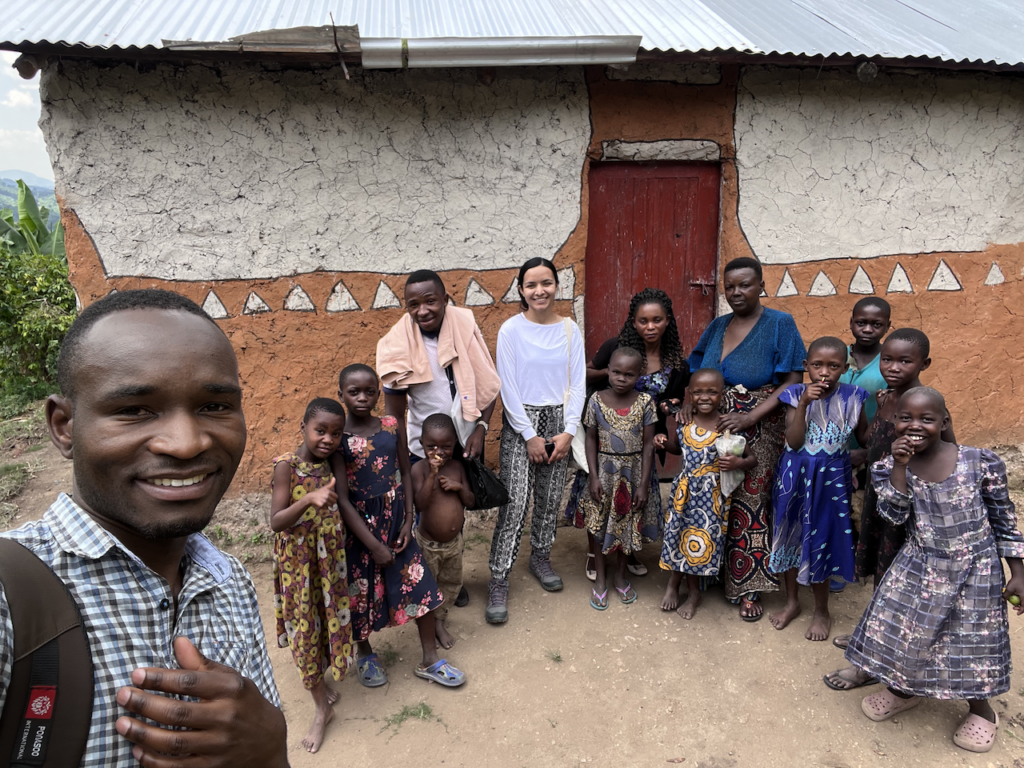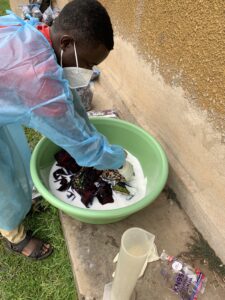The partnership between Uganda’s Mbarara University of Science and Technology, P-Healed, and the UNC Institute for Global Health and Infectious Diseases (IGHID), led by Ross Boyce, MD, MSc and Raquel Reyes, MD, MPA, focuses on improving the health and well-being of the people of Western Uganda. Rooted in understanding and serving local needs, students and trainees gain from research experiences that simultaneously advance practice. Most recently, the Uganda partnership expanded beyond its traditional home in the Bugoye Subcounty.
“It’s been a busy summer in Uganda, with some students departing and some just arriving. We’ve also expanded our work to St. Paul’s Health Centre IV,” Boyce said. “In the Kasese District, we have usually worked at the lower-level health centers, which are very rural if not remote. But when our patients are severely ill, they go from the small rural centers to St. Paul’s, which is in a more populated area.”

Returning from Uganda
Sujata Bhattarai Chhetri (MS-Y2), a medical student in the Global Health Scholarly Concentration Program, offered through IGHID’s Office of Global Health Education’s,” went to Uganda to begin collecting data for the Severe Malaria Project, led by Boyce.
“This is an observational study into the epidemiology of severe malaria where we are collecting demographic, clinical, and laboratory information from children admitted to the inpatient ward with a diagnosis of severe malaria. Our goal is to understand which children are most at risk, what type of symptoms they develop, and how they respond to available treatments,” explained Boyce. “This is important because malaria remains a leading cause of death among children in Uganda.”
Chhetri traveled to Uganda with a Kean Travel Fellowship Award from the American Society of Tropical Medicine and Hygiene. At St. Paul’s, she trained local nurses on how to enter data into study forms and helped define the specific roles and responsibilities for local nurses, research assistants, and doctors involved in the project. As part of another project, she also took part in a household survey where she had the opportunity to speak with local residents about malaria and collect data about prevention and care seeking strategies.

“Undoubtedly, my favorite part about Uganda was all of the kind people I got to meet, especially all the local research assistants who were welcoming and hospitable, who earn a living by assisting in the ongoing malaria research projects,” said Chhetri. “Being able to see first-hand the work they’re doing, and how passionate they are about the changes they are bringing to their communities, was inspiring.”
“I also had time to ponder my true motivations for wanting to work in global health. Aside from my upbringing in Nepal, I feel that being outside your comfort zone is when you truly grow and have meaningful experiences and deep connections. Having lived in a resource poor setting as well as realizing the abundance of opportunities and privileges I have in the U.S., truly motivates me to work globally, and give back where I can.”

Annika Gunderson (PhD-Y2), an epidemiology graduate student with the Gillings School of Global Public Health (GSGPH), also returned from Uganda, and Boyce is her academic advisor. Gunderson spent most of her time in Bugoye, studying the effectiveness of treating a fabric that women use to carry babies on their backs, with permethrin, in an effort to prevent malaria. The brightly colored printed cloth, known as lesu (or kanga in other parts of Africa), has unique meanings, and it plays an important role in culture. Gunderson also focused on building relationships with local collaborators, to assist with the development of her dissertation question.
“For the lesu study, I was able to observe clinic visits and the treating of lesus. We also rolled out a new phase of the study, investigating how the lesus are used in homes. I helped with the creation of data collection and quality control tools in REDCap as well as accompanied the team to pilot the forms for direct observation of lesu use.”
“The people were amazing, and the site was beautiful. I gained so much perspective about the challenges and reality of collecting data. It also gave me a lot more context for the data and for the associations we might be seeing as well as their limitations.”
Elise King (MPH-Y2), is another graduate student who returned from Uganda. She is working with Emily Ciccone, MD, MHS, to develop a novel molecular diagnostic assay for human brucellosis that can be implemented in resource-constrained settings, funded by the Burroughs Wellcome Fund/American Society of Tropical Medicine and Hygiene. King started working with the IDEEL group in 2020 as a lab technician for COVID studies. Then, in Fall 2022, she started the GSGPH Applied Epidemiology MPH program, and transitioned to being a graduate research assistant working with Ciccone. She has since spearheaded the laboratory component of assay development.
“This summer Elise traveled to Uganda to meet with our collaborator, Dan Nyehangane, who is the laboratory director at Epicentre in Mbarara (one of the Medecins Sans Frontieres research labs), and trial and troubleshoot the assay in its current form at Epicentre.” explained Ciccone. “She also visited some of the peripheral health facilities where ideally the assay would be used to assess the current infrastructure and think about how it should inform assay design.”
Arriving in Uganda
Jenny Kniss (MPH-Y2) is another student in the Applied Epidemiology Program at GSGPH. Boyce says she will continue the work Chhetri started.
“Sujata and Jenny did sort of a handoff, which is great, because it allows us to have continuity and multiple students working on the same project. She will be doing data collection and analysis for the Severe Malaria Project, for six weeks.”
